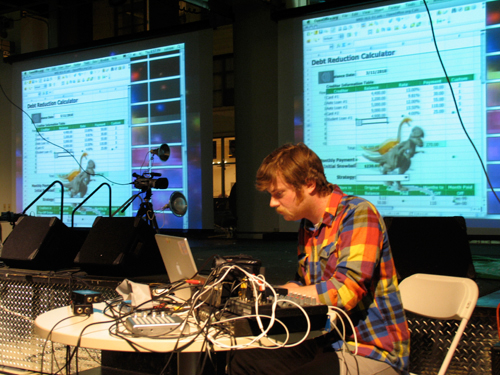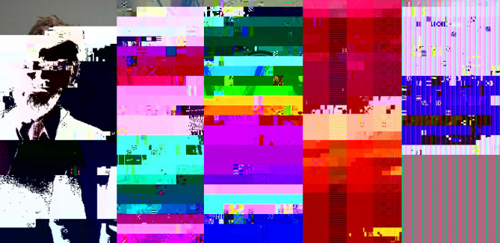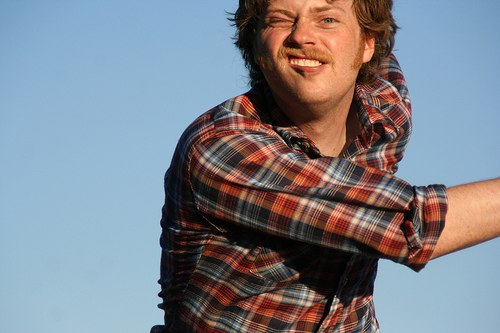QUESTIONS WITH JON SATROM
Could you briefly describe yourself as an artist and what you are working on right now?
I like to seek-out and exploit malfunctions, errors, and glitches and use them in my work. I make videos, play with code, and perform realtime audio/video.
As for art, right now, I’m working with a few folks to organize a glitch-art festival in Chicago SEPT 29 – OCT 3: HTTP://GLI.TC/H I’m collaborating on a non-“working” alternative operating system for the iPad called sOS (Satromizer OS) for a show called Funware in Eindhoven NL, and I’m preparing a couple desktop-performances utilizing spam and malware.
GLI.TC/H 2010 from jonsatrom on Vimeo.
a>.
If you were a teenage mutant ninja turtle, which one would you be and why?
This is a pretty difficult question. I like aspects of all. I’m intrigued by Raphael’s complexity, impulsiveness, and enjoy his sarcasm. But, sometimes, he is a bit too emo, which renders him difficult to relate to. Michelangelo gets points for nun-chucks, which are always a plus in my book. I appreciate Donatello’s inventiveness. He is creative in a technical way and always seems to be taking something apart or putting something together, which I can connect with. I have no idea why Leonardo never uses his katana blades. I really don’t like his top-down approach to leadership; I’m much more ground-up. He’s probably the one I least relate to. Rather than creating a mutant out of particular traits from all of them, I think I’ll switch sides and say that I would be the Shredder. He is always stirring up trouble, which I enjoy doing, and he seems to have near-endless resources, which would be nice. I don’t like how mean he can be, so, I would try to curb the anger and be a Nice Shredder. I’d also try to patch things up with the Turtles so we could be friends and hang out. It would be great to get to know the Turtles’ friends a bit better too, specifically: Mondo Gecko, Ace Duck, the Neutrinos, and Professor Honeycutt AKA Fugitoid. Maybe I’d invite everyone to a pizza party in Dimension X. Going through airport-security would be a huge hassle, but I guess I’d get use to it. Maybe I could borrow Krang’s flying body suit, or better yet, I could cruse around in the Technodrome.
Could you describe your earliest memory of you interacting with art of any kind, and how that has perhaps stayed with you and your practice?
A few years ago, my parents were doing a bit of home-purging, and sent me a book from my childhood. It was a really cool book that allowed kids to document weird things in there surroundings. eg: “We have ___ spoons.” or “My room has ___ electrical outlets.” It had one section about the future; I don’t remember doing it, but it says, in my little kid handwriting, “I want to be an __artist__, when I grow up.” I’ve always wanted to be an artist and known that art is important to me. Ironically, I still don’t exactly know what being an artist is. It’s how I operate. It’s who I am. I know that may sound cheesy, but it’s for reals.
Were you always into digital arts? Every dabble in analog stuff? How did you end up so enthralled with the digital world?
Electronic and mechanical things have always interested me. From machinery at my uncle’s farm in North Dakota to the community access television studio I worked at in high school; I was always drawn to technology. Being involved with video as the web took off in the mid-nineties was really exciting. Heck, it’s still really exciting…
You have your hands in many arts circles around the city, how important is that to you?
Collaboration and supporting fellow artists is super important to me. There are so many folks doing such great work in Chicago. From noise music to independent film; glitch art to experimental realtime performance, there is a lot going on here. I wish I could go to more shows, openings, and happenings. Being involved is inspiring and invigorating.
What is one of your biggest challenges as an arts professional?
Balance and time are the biggest challenges. Balancing work that pays the bills and finding time to make artwork. I feel like that’s somewhat universal as one ages, so, I’ll come up with a better answer… I like to use humor in my artwork. Often, striking the right tone can be challenging. Sometimes, I want things to be crazy and ridiculous, but I also want people to seriously experience the work. I have a sort of strange commitment to seriously being absurd. I find humor in weird uses of technology or odd presets. The funny thing is: I’ll spend hours teaching myself how to best misuse a particular feature in a software package that I have no logical use for. Experts says that our culture is moving more and more toward specialization. My specialized skill-set is fractured and idiotic; but, I don’t really believe in experts anyway.
What do you enjoy about art in Chicago?
Chicago has a wonderful do-it-yourself (DIY) energy that can be hard to find in other cities. I feel like this comes from Chicago’s working-class history. This ethic has produced unique artists and artwork for decades. If someone else isn’t doing something that excites you; you can go out and do it yourself or find others who want to do-it-together.
As an artist and educator, how does learning fit into your career?
I am learning that I am learning all the time.
If you were a James Bond villain on the verge of killing 007, how would you describe your plans to take over the world?
I’d probably get distracted while describing my elaborate shark-contraption that he would eventually escape from.
If you could offer one piece of advice to new or emerging digital artists, what would that be?
The great thing about technology right now is our open access to information and the immediacy of making and publishing. Don’t be afraid to break things and get dirty. Technology often has a slickness that goes along with it. I remember it from the late 90s and the internet bubble. It’s now embodied in the friendly social media systems we use. But, technology isn’t clean, it isn’t always efficient, and it definitely isn’t perfect. Many folks think that they don’t know enough or aren’t technical enough to make digital stuff. That’s so unfortunate. There are no true experts; everyone is experimenting. Often failure is more interesting than success. It’s a dirty digital world and it can be your playground.
For more information about Jon and his work, please visit JonSatrom.com.



